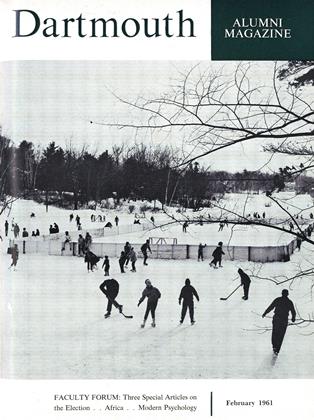By FrancisSteegmuller '27. New York: Farrar, Strausand Cudahy, 1960. 213 pp. $3.75.
Like Robert Frost, Francis Steegmuller spent only a year at Dartmouth. Like Frost he is still an alumnus very much worth claiming. He has been a steady contributor to The New Yorker for many years; he has had the pleasure during his own lifetime of seeing his Flaubert and Madame Bovary hailed as a classic; he has been as successful as novelist and short story writer as he has been as scholar. He even writes poetry.
The Christening Party is Mr. Steegmuller's seventh novel and seventeenth book. The locale if not the time will be familiar to many Dartmouth graduates. The book is laid in "Waverly," Connecticut, a budding exurb near Stamford which seems to occupy the same ground as Greenwich. The year is 1906.
Of characters there are so many it is hard to keep them all in mind, much less their relationships. There's Bishop Dugan of the Catholic diocese of Connecticut and his brother the Judge (of Waverly probate court). There is that one of Judgy's three daughters who escaped a convent, and her husband, a man with low relations in Stamford. There are sisters, brothers, cousins, and aunts beyond the numbering, nearly all of them vividly drawn. There's even a visiting Englishman, the Hon. Noel Kitcat, whose interest in archeology is exceeded only by his density when it comes to understanding Americans.
All of these characters - together with some of the original Waverly Protestants - are drawn together for the christening of Judgy's second grandchild and first granddaughter. On the surface the events of the day are slow - suffused with that kind of nostalgia which seems almost inevitable when 1961 considers 1906. But leisurely and even slight though the novel is, a great deal actually happens that day, including what amounts to a murder. The Honorable Noel, in the funniest scene of the book, goes to dig up an Indian mound. Judgy finally gets a decent probate fee, after many fee-hungry years. Margery, the youngest and prettiest aunt, gets the promise of a husband, on condition she give up living in sin. The seven-year-old narrator gets as much new information as a boy can handle in one day. And Dr. Oscar Hornbeck gets an extraordinary death.
This is a book as wistful as a daguerreotype. And while not Mr. Steegmuller's best, it is a charming one.
 View Full Issue
View Full Issue
More From This Issue
-
 Feature
FeatureA Dollop of Yankee Talk
February 1961 -
 Feature
FeatureCampus Cosmopolitans
February 1961 -
 Feature
FeatureNow They're Flicks, Not Movies, But The Nugget Still Carries On
February 1961 By GEORGE O'CONNELL -
 Feature
FeatureDr. Myron Tribus of UCLA Named Dean of Thayer School
February 1961 -
 Feature
FeatureSNOW TIME
February 1961 -
 Article
ArticleProblems of Land Development in the New African Nations
February 1961 By BARRY N. FLOYD,
NOEL PERRIN
-
 Feature
FeatureTeaching at a Communist University
JUNE 1971 By NOEL PERRIN -
 Article
ArticleThe Prize Nobody Wins
JUNE 1978 By NOEL PERRIN -
 Feature
FeatureAn Environmental B
Winter 1993 By Noel Perrin -
 Article
ArticleCoaching
SEPTEMBER 1996 By Noel Perrin -
 Article
ArticleA Cubicle of One's Own
JUNE 1997 By Noel Perrin -
 Article
ArticleThe Difference With Oberlin
APRIL 1998 By Noel Perrin
Books
-
 Books
BooksTAMING MEGALOPOLIS. WHAT IS AND WHAT COULD BE (Vol. 1). HOW TO MANAGE AN URBANIZED WORLD
JANUARY 1968 By DAVID R. GODSCHALK '53 -
 Books
BooksPOEMS.
January 1958 By DILYS LAING -
 Books
BooksLiving Together
March 1977 By DONALD W. McNEMAR -
 Books
BooksPENN STATE YANKEE
December 1953 By Herbert F. West '22 -
 Books
BooksTHE SEA WITCH
JULY 1968 By JOHN HURD '21 -
 Books
BooksITALIAN ODYSSEY, AN EAR TO THE WIND.
OCTOBER 1969 By PENNINGTON HAILE '24

